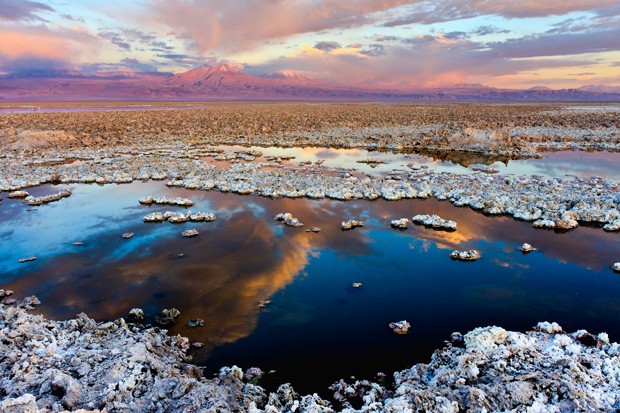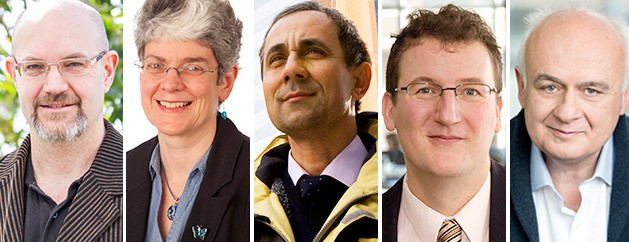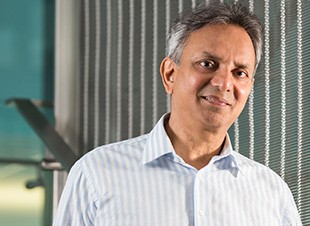Paul Shrivastava (right), executive director of international research program Future Earth:
Future Earth is an international program which aims to intensify the impact that research makes on the world, and to find innovative new ways to accelerate sustainable development. We coordinate projects seeking to understand how the Earth system works and is changing, the links between environmental changes and human well-being and development, and how we can transform into sustainable and equitable societies.
What role does university research and higher education play in a more sustainable future?
Walker: Today's generation of young adults faces a series of unique challenges with respect to resource depletion, overpopulation, and climate change. Addressing and overcoming these problems requires both awareness and informed action-taking.
I believe that our students can greatly benefit if they are exposed to or even involved in the scholarly research we undertake as faculty members. In many disciplines, one can observe a disconnect between research and teaching. Sustainability, however, affects everyone and thus offers unique opportunities for student engagement and hands-on training.
Shrivastava: Research is vital for understanding major global sustainability challenges such as delivering energy, food and water to all, building societies that are resilient to climate change, and understanding what a sustainable future looks like. Many of the thousands of researchers involved in Future Earth are based in universities. But we also need to work with people outside the research community to make sure that knowledge really makes a difference to society.
Mulligan: Universities can expand scientific knowledge and develop innovative strategies and technologies that will strengthen the nation's leadership in creating solutions to help sustain the Earth's natural resources.
Their role is to provide a vital stage for the exchange of interdisciplinary research and perspectives, uniting nationally and internationally acclaimed researchers. They should provide a unique location — for interdisciplinary undergraduate and graduate programs in water and energy focused, sustainable engineering — for training future graduates that will be engaged with the challenge of working towards a more sustainable society.
Athienitis: CZEBS is a university-recognized research unit, which accomplishes its mission by enriching the learning and research experience of students, and by assisting industry in implementing research results and innovations that will help the building industry incorporate more sustainable practices and technologies.
Stoett: Universities have an obligation to contribute critical thinking and constructive solutions to the different aspects of sustainability: economic, social, environmental. They should play a leading role in educating the next generation of thinkers and researchers toward that end, and Concordia is emerging as a leading institution.
We also need to collaborate with other institutions, such as Future Earth; and Concordia has recently joined the United Nations Environmental Programme's Global University Partnership for Environmental Sustainability which includes over 500 universities, many of them in the southern hemisphere. This combination of networking and generating original research is key to the mandate of the contemporary university.
Satir: Globalization, information technology and competition fuelled the growth of new business models based on quick cost cutting and high growth. Recently, however, many enterprises have seen environmentally aware consumers who express preferences for sustainable products and services. Business schools play an important role in helping meet such challenges.
In your opinion, what should be humanity's most immediate priority for the planet?
Athienitis: To discover and/or develop sources of energy that have limited environmental impacts. To implement known sustainability and efficiency principles in industrial practices
Mulligan: The most immediate priority is the lack of sufficient water, quantity and quality, which is a looming crisis. California is a prime example of this, where the rivers are drying up due to lack of rain, and high levels of consumption. Water has to be trucked into communities and there are mandatory cuts in consumption. There needs to be a more important focus on the nexus between sustainable water and sustainable energy.
Stoett: We need to critically assess where we are: the rates of natural decline, changes in climate, biodiversity loss, the continued spread of pollution, all of which have short and long-term impacts on human health. There is no one priority, but the need to meet many simultaneous and interlinked challenges.
Walker: Given the conflict between personal wealth considerations on one hand and the need to make our planet and our way of life more sustainable, I believe that it is of utmost importance to identify sustainability as a goal that all countries should pursue.
One way of accomplishing this may be through the development of supranational policies that reward countries for acting in a sustainable fashion and penalize them if they do not. Similar regulations do exist for specific industries (e.g. the aviation sector) and with respect to high-risk technologies (e.g. nuclear fusion). Understanding that unsustainable actions affect us all and therefore need to be regulated globally would allow us to take an important first step in the right direction. In addition, a global regulatory approach would reduce the influence of local lobbying groups that often stand in the way of real reform.
Shrivastava: This year, nations will agree to a set of universal Sustainable Development Goals to be achieved by 2030: signing up to goals on challenges facing humanity such as ending hunger, addressing climate change and improving health. These challenges are complex and interconnected, and the SDGs are a once-in-a-generation chance to make a difference worldwide. Future Earth will help provide the research to meet these goals.
Satir: Peace in the world. The dividends will be in terms of human lives, human dignity and trillions of dollars freed up — becoming available for environmental and humanitarian development.
Find out how Concordia became a leader in green building. Learn about sustainability at Concordia.
Credit: vignette photo of Upsala Glacier by David (Flickr Creative Commons)


 Salar de Atacama, Chile | Photo by By Francesco Mocellin, via Wikimedia Commons
Salar de Atacama, Chile | Photo by By Francesco Mocellin, via Wikimedia Commons
 Research directors Peter Stoett, Catherine Mulligan, Andreas Athienitis, Thomas Walker and Ahmet Satir
Research directors Peter Stoett, Catherine Mulligan, Andreas Athienitis, Thomas Walker and Ahmet Satir
